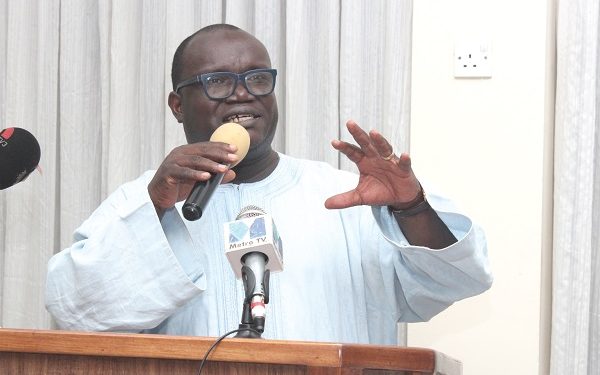The Ghana Chamber of Mines (GCM) has raised grave concerns about the proposed mining reforms that seek to reduce the tenure of a mining lease from 30 to 15 years.
According to the chamber, although the move by the government to amend the Minerals and Mining Act, 2006 (Act 703) to reflect the country’s agenda to bolster local ownership of mining sector was progressive, reducing the lease period would be inimical and counterproductive.
The Chief Executive Officer of the GCM, Dr Kenneth Ashigbey, said halving the lease period had the tendency to make the mining industry unattractive to both local and foreign investors.
He stressed that apart from discouraging capital inflows, a reduced lease tenure would invariably compromise the economic viability of mining projects.
“If the tenure is short, when you do your net present value (NPVs), you will find out that the project is not feasible; and if it is not feasible, nobody will bring money to invest. It will not affect only foreign direct investment, but also local direct investment,” he said.
Dr Ashigbey further explained that a shorter mining lease period could be counterproductive because it would encourage unsustainable practices, particularly high grading, a development where mining companies focused on extracting high-value ore within the limited lease period and abandon lower-grade deposits.
He added that such a development would compromise the economic viability of “deep-seated, complex, and marginal ore bodies” and retard growth in the mining sector.
Mining activities have been taking place in the country since 1897.
Currently, there are 13 large-scale mining companies in the country, with the government having an automatic 10 per cent stake, known as carried interest, in those companies.
The existing mining law Minerals and Mining Act, 2006 (Act 703), has not seen a major review in almost 20 years.
The Minerals and Mining Policy of the country, which came into existence in 2014, has not been revised since, although a revision is required every five years.
Currently, there is an ongoing engagement by the Minerals Commission with key stakeholders to produce a revised mining policy and a new mining law that will ensure that mineral exploitation benefits the country and its citizens.
Presenting highlights of the proposed reforms to Act 703 at a roundtable discussion organised by the Institute of Economic Affairs (IEA) on August 24, the CEO of the Minerals Commission, Martin Ayisi, said the new regime would peg the upper limit for any mining lease in the country at 15 years.
Mr Ayisi had justified that the granting of 30-year leases was no longer common across the world and could not be retained in Ghana.
For instance, he said African countries such as Kenya, Burkina Faso, Cote d’Ivoire and Mali had leases between 15 and 25 years.
Among the major proposals in the new mining regime was capping prospecting licence such that it would not be renewed more than twice after the initial term of three years.
The proposed reforms also reduced the upper limit of stability period of 15 years to any period not exceeding five years to cover the capital recovery period for the investment.
In terms of community development agreements (CDA), he said the amended law also had a new provision for holders of a mining lease to sign an agreement with the communities that would be impacted by their mining operations within six months after the granting of the mining lease.
Positive verdict
In what can be described as a surgical critique of the reforms, Dr Ashigbey said the proposal to include a middle tier to the country’s mining ecosystem was a great idea as it would help some players in the small-scale sector to upgrade to the middle tier and ensure growth in the sector.
Again, he said the proposal in the new regime to set a timeline for the ratification of mining leases by Parliament was progressive as delays in ratifying the contracts had proven inimical to the country.
He also said the approach the Minerals Commission had adopted to engage relevant actors in the mining space on the reforms was commendable and needed to be emulated by other state institutions.
Alternative proposals
However, regarding the reduction of the mining lease period, Dr Ashigbey proposed that the tenure of the leases, alongside their frequency and duration of renewal, should be maintained as provided for in in Act 703.
However, they said the period of the lease and renewals could be tied to the project economics.
Touching on the proposed reduction in the duration of stability agreements from 15 to five years, he said it was the view of the GCM that the agreements should have a minimum of 10 years.
He argued that stability agreements provided predictability for projects with significant capital expenditure and long lease time for capital recovery.
Again, he said longer stability agreement regime enabled investors to earn fair returns on their investments.Regarding the proposal to abolish community development agreements, the GCM CEO recommended that the agreements should be maintained and leveraged as a tool for attracting large-scale investments in the mining sector.
Dr Ashigbey also said rather than reducing the period for prospecting licence to nine years, the chamber was of the view that it should be retained as provided for in Act 703.
However, he said renewals of the licence could be tied to the verifiable evidence of work undertaken by the licence holder.
He called for enhanced collaborative stakeholder dialogue with the government to ensure that the reforms created a stable investment climate.
source: graphiconline



